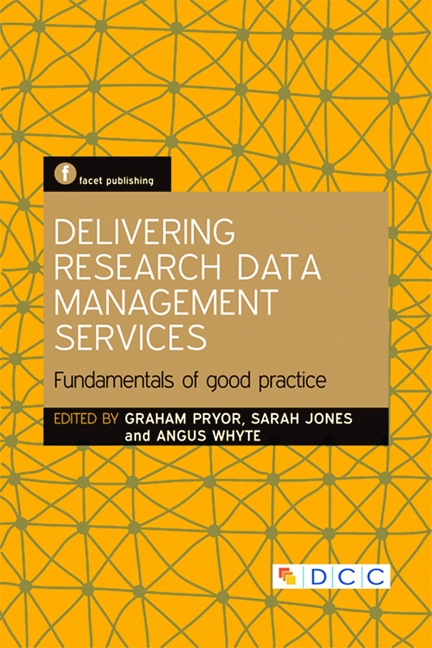Book contents
- Frontmatter
- Contents
- Preface
- Contributors
- 1 A patchwork of change
- 2 Options and approaches to RDM service provision
- 3 Who's doing data? A spectrum of roles, responsibilities and competences
- 4 A pathway to sustainable research data services: from scoping to sustainability
- 5 The range and components of RDM infrastructure and services
- 6 Case study 1: Johns Hopkins University Data Management Services
- 7 Case study 2: University of Southampton – a partnership approach to research data management
- 8 Case study 3: Monash University, a strategic approach
- 9 Case study 4: a national solution – the UK Data Service
- 10 Case study 5: development of institutional RDM services by projects in the Jisc Managing Research Data programmes
- Index
5 - The range and components of RDM infrastructure and services
Published online by Cambridge University Press: 08 June 2018
- Frontmatter
- Contents
- Preface
- Contributors
- 1 A patchwork of change
- 2 Options and approaches to RDM service provision
- 3 Who's doing data? A spectrum of roles, responsibilities and competences
- 4 A pathway to sustainable research data services: from scoping to sustainability
- 5 The range and components of RDM infrastructure and services
- 6 Case study 1: Johns Hopkins University Data Management Services
- 7 Case study 2: University of Southampton – a partnership approach to research data management
- 8 Case study 3: Monash University, a strategic approach
- 9 Case study 4: a national solution – the UK Data Service
- 10 Case study 5: development of institutional RDM services by projects in the Jisc Managing Research Data programmes
- Index
Summary
Introduction
This chapter describes the range of infrastructure and services that institutions may wish to develop to support research data management (RDM). It draws primarily on work from the Jisc Managing Research Data programmes and the Digital Curation Centre's institutional engagements with UK universities. Some examples from Australia, Europe and the USA are also included. As a series of practical steps, this chapter amplifies the introduction to roles and responsibilities given in Chapter 3 and the process of developing services covered by Chapter 4, while at the same time setting the context for the case studies to follow.
An outline of potential infrastructure and support
A range of services are needed to support the creation, management and sharing of research data. Figure 5.1 visualizes the different aspects to be addressed. These fall broadly into three categories:
An overarching governance framework to shape the delivery of services.
Specific infrastructure and services provided at key points in the data lifecycle.
Assistance from support staff to aid the uptake and use of services.
Overarching elements of policy, strategy and business case are needed to set the framework in which RDM services will be delivered. These elements will help in defining an institution's approach, in planning the programme of work and ensuring that the proposed infrastructure and support services will be sustainable.
A range of infrastructure and support services is needed at key points in the data lifecycle. Many institutions and research funders require data management plans (DMPs), so guidance, templates, tools and consultancy services may be offered to support this initial activity in the lifecycle. Infrastructure and services are also needed to manage data during the active phase of research, namely data storage and the appropriate tools to facilitate access and collaboration. Not all data will need to be preserved and shared. Processes for data selection and handover will help to identify which data has longterm value and pass this on to appropriate services for longterm curation. Data catalogues and repository services are also needed to preserve data and promote reuse. It is unlikely that an institution will provide all of these components by itself, as there is a wealth of existing infrastructure and services at disciplinary, national and international level.
- Type
- Chapter
- Information
- Delivering Research Data Management ServicesFundamentals of Good Practice, pp. 89 - 114Publisher: FacetPrint publication year: 2013
- 5
- Cited by



